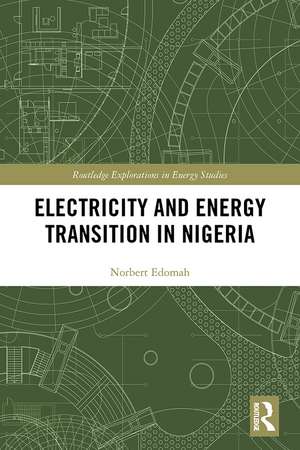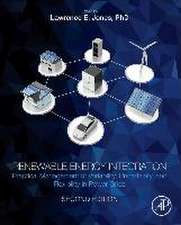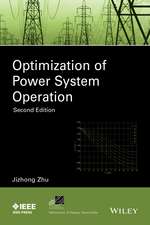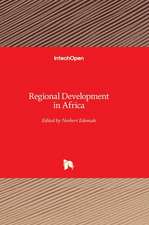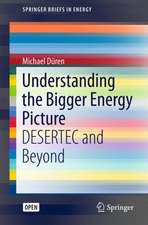Electricity and Energy Transition in Nigeria: Routledge Explorations in Energy Studies
Autor Norbert Edomahen Limba Engleză Hardback – 20 feb 2020
The book starts by introducing the basic theories underpinning the politics of energy infrastructure supply and goes on to explore the historical dimensions of the Nigerian energy transition by highlighting the influences and drivers of energy systems change. Edomah also examines the political dynamics at play, highlighting the political actors and institutions that shape energy supply, as well as the impact of consumer politics. The book concludes by considering how all these factors may influence the future of energy in Nigeria.
This book will be of great interest to students and scholars of energy transitions, energy technology and infrastructure, and African Studies more generally.
| Toate formatele și edițiile | Preț | Express |
|---|---|---|
| Paperback (1) | 382.75 lei 6-8 săpt. | |
| Taylor & Francis – 30 sep 2021 | 382.75 lei 6-8 săpt. | |
| Hardback (1) | 1000.27 lei 6-8 săpt. | |
| Taylor & Francis – 20 feb 2020 | 1000.27 lei 6-8 săpt. |
Din seria Routledge Explorations in Energy Studies
-
 Preț: 312.09 lei
Preț: 312.09 lei -
 Preț: 310.95 lei
Preț: 310.95 lei -
 Preț: 311.62 lei
Preț: 311.62 lei -
 Preț: 389.38 lei
Preț: 389.38 lei - 17%
 Preț: 272.64 lei
Preț: 272.64 lei -
 Preț: 294.15 lei
Preț: 294.15 lei -
 Preț: 383.30 lei
Preț: 383.30 lei -
 Preț: 387.20 lei
Preț: 387.20 lei -
 Preț: 382.75 lei
Preț: 382.75 lei -
 Preț: 386.22 lei
Preț: 386.22 lei -
 Preț: 383.12 lei
Preț: 383.12 lei -
 Preț: 394.51 lei
Preț: 394.51 lei - 18%
 Preț: 259.98 lei
Preț: 259.98 lei -
 Preț: 362.05 lei
Preț: 362.05 lei -
 Preț: 389.11 lei
Preț: 389.11 lei -
 Preț: 389.66 lei
Preț: 389.66 lei -
 Preț: 247.85 lei
Preț: 247.85 lei -
 Preț: 380.03 lei
Preț: 380.03 lei - 18%
 Preț: 1023.61 lei
Preț: 1023.61 lei -
 Preț: 389.66 lei
Preț: 389.66 lei -
 Preț: 393.52 lei
Preț: 393.52 lei - 18%
 Preț: 950.89 lei
Preț: 950.89 lei - 18%
 Preț: 997.77 lei
Preț: 997.77 lei - 9%
 Preț: 936.08 lei
Preț: 936.08 lei -
 Preț: 389.66 lei
Preț: 389.66 lei
Preț: 1000.27 lei
Preț vechi: 1219.84 lei
-18% Nou
Puncte Express: 1500
Preț estimativ în valută:
191.46€ • 208.04$ • 160.93£
191.46€ • 208.04$ • 160.93£
Carte tipărită la comandă
Livrare economică 22 aprilie-06 mai
Preluare comenzi: 021 569.72.76
Specificații
ISBN-13: 9780367201418
ISBN-10: 0367201410
Pagini: 200
Ilustrații: 28 Line drawings, black and white; 14 Tables, black and white; 28 Illustrations, black and white
Dimensiuni: 156 x 234 x 13 mm
Greutate: 0.45 kg
Ediția:1
Editura: Taylor & Francis
Colecția Routledge
Seria Routledge Explorations in Energy Studies
Locul publicării:Oxford, United Kingdom
ISBN-10: 0367201410
Pagini: 200
Ilustrații: 28 Line drawings, black and white; 14 Tables, black and white; 28 Illustrations, black and white
Dimensiuni: 156 x 234 x 13 mm
Greutate: 0.45 kg
Ediția:1
Editura: Taylor & Francis
Colecția Routledge
Seria Routledge Explorations in Energy Studies
Locul publicării:Oxford, United Kingdom
Public țintă
PostgraduateCuprins
1. Introduction PART 1: Energy demand and supply theories 2. Theories underpinning electricity demand and infrastructure supply PART 2: Historical dimensions of the Nigerian energy transition 3 What really happened? The evolution of energy infrastructure provision (1800 – 2018) 4. What triggered change? Influences and drivers of energy systems change PART 3: Political dynamics of energy systems change 5. Governing energy 6. Governance and transitions 7.Politics on the consumer side 8. Energy and industrial policy: How poorly implemented energy policies impacts industrial growth PART 4: The future of energy 9. What should future electricity look like? 10. The quest for cleaner energy production 11. Implications of the on-going transitions and its consequences for the future of energy in West Africa 12. Conclusions
Notă biografică
Norbert Edomah is a Senior Lecturer at the School of Science and Technology, Pan-Atlantic University Lagos, Nigeria. His research interests include: industrial energy efficiency and cleaner production; influences underlying changes in energy supply infrastructure; politics of energy infrastructure supply; public policy to improve energy security; and planning and organization of the electricity markets in developing African countries. He is keen on understanding how people respond to (and influence) changes in energy infrastructure systems.
Recenzii
"A much needed, original, fresh contribution to both the sustainability transitions and energy studies communities. Extensive in its coverage, and impressive in its scope, this book offers an insightful and comprehensive analysis of Nigeria’s past, present, and future energy challenges. Focusing on topics as diverse as governance, politics, consumers, industrial policy, and the future, it offers highly generalizable results that should be relevant—and read—by researchers well beyond West Africa." -- Benjamin K. Sovacool, Professor of Energy Policy at the University of Sussex, UK, and author of Energy Security, Equality and Justice as well as Visions of Energy Futures
"Every country in the world is faced with the need for massive changes to their energy infrastructure in order to meet the climate emergency that we now face. To do this understanding what has shaped our current energy systems is vital and in Electricity and Energy Transition in Nigeria the history of energy systems in Nigeria is clearly laid out and discussed within the context of this future challenge." -- Aled Jones, Professor and Director of the Global Sustainability Institute, Anglia Ruskin University Cambridge, UK
"A keen insight and good read on the role of policy, politics and governance in Nigerian energy supply infrastructure" -- Liz Varga, Professor of Complex Systems Infrastructure, University College London, UK
"A look beyond questions of technology and investments is very much needed in order to give direction to the development of the Nigerian electricity market. One cannot deny the fear that population growth will outpace electricity provision for the next few decades, whilst policy making seems slow and profit oriented. Creative disruptions in the decentralized renewable energy sector point to innovations and "made in Nigeria" solutions, which now need to be taken into account by policy makers. Insights into the political dynamics for achieving step change and providing more power to the millions of Nigerians whose productive energies wait to be liberated, are very welcome!" -- Christine K, Director Heinrich Boell Foundation Nigeria Office (2010-2019)
"The author is well-informed in energy and its components. The book analyses Nigeria’s energy situation from historical, present and future dimensions. The book highlights the inevitable need to change the energy policies, models of energy distribution and sources of energy supply. Surprisingly the book also highlights possible future models of electricity". -- Sanusi Ohiare, Executive Director, Rural Electrification Fund (REF), Rural Electrification Agency of Nigeria
"Every country in the world is faced with the need for massive changes to their energy infrastructure in order to meet the climate emergency that we now face. To do this understanding what has shaped our current energy systems is vital and in Electricity and Energy Transition in Nigeria the history of energy systems in Nigeria is clearly laid out and discussed within the context of this future challenge." -- Aled Jones, Professor and Director of the Global Sustainability Institute, Anglia Ruskin University Cambridge, UK
"A keen insight and good read on the role of policy, politics and governance in Nigerian energy supply infrastructure" -- Liz Varga, Professor of Complex Systems Infrastructure, University College London, UK
"A look beyond questions of technology and investments is very much needed in order to give direction to the development of the Nigerian electricity market. One cannot deny the fear that population growth will outpace electricity provision for the next few decades, whilst policy making seems slow and profit oriented. Creative disruptions in the decentralized renewable energy sector point to innovations and "made in Nigeria" solutions, which now need to be taken into account by policy makers. Insights into the political dynamics for achieving step change and providing more power to the millions of Nigerians whose productive energies wait to be liberated, are very welcome!" -- Christine K, Director Heinrich Boell Foundation Nigeria Office (2010-2019)
"The author is well-informed in energy and its components. The book analyses Nigeria’s energy situation from historical, present and future dimensions. The book highlights the inevitable need to change the energy policies, models of energy distribution and sources of energy supply. Surprisingly the book also highlights possible future models of electricity". -- Sanusi Ohiare, Executive Director, Rural Electrification Fund (REF), Rural Electrification Agency of Nigeria
Descriere
This book provides readers with a detailed account of the dynamics of energy infrastructure change in Nigeria’s electricity sector. It will be of great interest to students and scholars of energy transitions, energy technology and infrastructure, and African Studies more generally.
